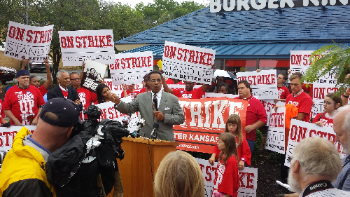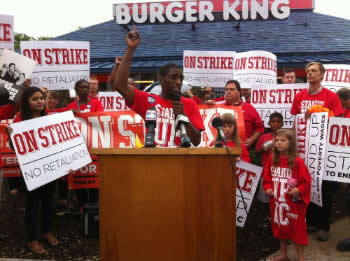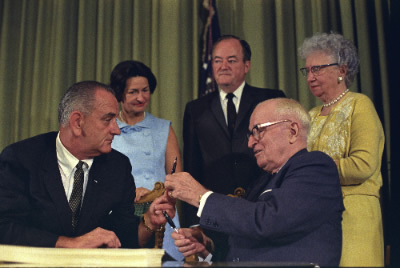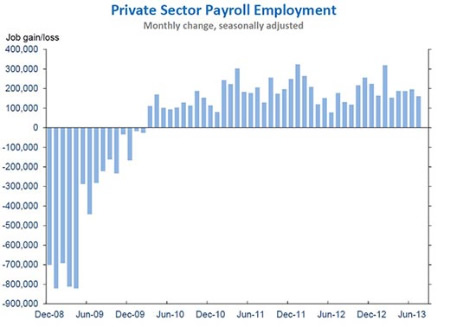 | | | | | | | ASKING FOR A LIVING WAGE
 Right now, all around the country, people are just trying to put in an honest day's work to help themselves and their families. These are people doing all of the things we tell them they are supposed to do in America to get ahead. They are working hard, playing by the rules, and trying to provide for their families. But they're finding that it's not enough. You know it is not enough. Maybe you know all too well what I mean; maybe what I describe is all too real. Right now, all around the country, people are just trying to put in an honest day's work to help themselves and their families. These are people doing all of the things we tell them they are supposed to do in America to get ahead. They are working hard, playing by the rules, and trying to provide for their families. But they're finding that it's not enough. You know it is not enough. Maybe you know all too well what I mean; maybe what I describe is all too real.
For decades, the needs of low-wage workers have been ignored. On Monday, I was proud to stand with workers—some of whom hold down two jobs just to put food on the table—as they rallied for a living wage and workers' rights.
Wages have been stagnant for a generation, and the fastest growing jobs in our economy are also the lowest paid. Fast food, retail, home health, childcare and security jobs are growing, but they don't pay enough to cover basic necessities like food, clothing and rent. The real value of the minimum wage is at a historic low. Today, 40 percent of American workers make less than the minimum wage was worth in 1968. That's nearly a quarter of all workers. They often qualify for food stamps and other public assistance, which means that big, profitable corporations are forcing taxpayers to subsidize their low wages and burdening our economy.
 | Terrence Wise, KC Fast Food Worker, talks about his experience working two jobs to provide for his daughter |
It doesn't have to be this way. That's why fast food and retail workers are joining together to demand $15 an hour and the right to form a union without retaliation. It's a wage that will allow them to cover their basic needs and help lift our entire economy. By putting more money into the pockets of workers in fast-growing low-wage jobs, we can get our economy moving again and rebuild the middle class. And the protection of a contract will prevent companies from the unlawful treatment and manipulation of hours that has come to define too many American jobs.
The minimum wage is about valuing and respecting work. No one who works hard and plays by the rules should live in poverty. Raising the minimum wage helps families make ends meet.
AN UPDATE FOR SENIORS AND THEIR FAMILIES
 | In Independence, Missouri, President Lyndon B. Johnson signs Medicare and Medicaid into law, and hands President Harry Truman the pen. LBJ held the ceremony there to honor President Truman's leadership on health insurance, which he first proposed in 1945. |
I may be dating myself in this sentence, but many people do not know that before Medicare was enacted in 1965, half of all seniors were uninsured. Old people were long considered ‘bad risks' by commercial insurers, and unions had not made much headway in obtaining coverage for retired workers through employer-sponsored plans. Before Medicare and Medicaid, a quarter of the elderly lived in poverty, but today, less than a tenth do. Today, 42 million seniors and 9 million people with disabilities receive Medicare's guaranteed benefits, including hospital visits and physician services and prescription drugs through private plans. And Medicare does this at a great rate for taxpayers--Medicare's administrative costs are less than 2 percent. Medicare's per capita costs increased by only 0.4% in 2012, substantially below the 3.4% increase in per capita GDP.
The new health law is closing the Part D prescription drug "donut hole" – which is eliminated in 2020 – saving seniors an average $18,000 in drug costs over the next decade. More than 7,500 seniors in the district received prescription drug discounts worth $9.7 million, an average discount of $580 per person in 2011, $640 in 2012, and $900 thus far in 2013. Key preventive services – like cancer and diabetes screening – are free, and 112,000 seniors in the Fifth District alone are eligible for these services. In 2012, over 34 million seniors received at least one free preventive service. New tools to crack down on fraud have already saved $15 billion. Finally, eliminating fraud and improving efficiency has extended the solvency of the Medicare Trust Fund by 8 years.
I know seniors cannot afford higher out-of-pocket costs. Many seniors pay three monthly premiums – for Part B, Part D drug plans, and Medigap. In 2012, half of all seniors had annual incomes of $22,500 or less. Half of older women have incomes below $15,072. The average senior on Medicare pays $4,500 a year on health care – three times the amount paid by non-Medicare households. Seniors' health burdens are increasing. In 1980, out-of-pocket medical costs represented 7% of the average Social Security benefit. In 2010, that number rose to 26%.
We can improve and extend Medicare without shifting costs to seniors. Seniors are already paying over half of their total health and long-term care costs – including the cost of hearing aids, dental, and vision care not covered by Medicare. Building on the new health law, we can continue efforts to eliminate fraud and waste, focus on prevention, help doctors to improve quality and coordinate care, and reduce prescription drug costs by giving Medicare the authority to negotiate for savings, as the VA does today.
Check back next week and I will share an update on Medicaid.
JOBS NUMBERS

The most recent employment report provides further evidence that the U.S. economy is continuing to heal from the wounds inflicted by the worst downturn since the Great Depression. We lost more than 8 million jobs as a result of the Great Recession. Since the President has taken office, we have seen the number of private sector jobs increase for 37 straight months, adding 6.5 million private sector jobs during that time period.
Today's report from the Bureau of Labor Statistics (BLS) indicates that the unemployment rate declined from 7.6 percent to 7.4 percent in July, reaching its lowest level since December 2008. The unemployment rate for African Americans fell from 13.7 percent to 12.6 percent, also its lowest level since December 2008. The unemployment rate for women fell from 7.3 percent to 7.0 percent, its lowest level since January 2009, and from 7.8 percent to 7.7 percent for men.
The establishment survey showed that private sector employers added 161,000 jobs last month (see chart below). Total non-farm payroll employment rose by 162,000 jobs in July. The economy has now added private sector jobs for 41 consecutive months, and a total of 7.3 million jobs have been added over that period. So far this year, 1.4 million private sector jobs have been added.
With the recovery entering its fifth year, we need to build on the progress we have made so far and now is not the time for Washington to impose self-inflicted wounds. The across-the-board budget cuts known as the sequester continue to be a drag on the economy now and in the future. From the American Jobs Act to the Farm Bill, there are plenty of things we in Congress can do to help spur the economy and create jobs. If Congress could come together to pass the entire American Jobs Act, which includes further investment in infrastructure to rebuild our Nation's ports, roads and highways, and assistance to state and local governments to prevent layoffs and to enable them to rehire hundreds of thousands of teachers and first responders, then we could create more than a million jobs. Congress must come together to create jobs, restore confidence in our economy, and rebuild the middle-class. As I meet with many constituents over the August recess, I remain committed to listening to your views and working hard on this most important issue.
CIVILITY CORNER
There is, I believe, a very real possibility that Social Media, as transformational as it is, will over time have a nullifying effect on flower and lyrical writing skills of the so called millennial generation. Had the sagacious and scholarly Henry David Thoreau and Ralph Waldo Emerson communicated via texting, would we have the literary charm found in the correspondence between these philosophical behemoths?
Emerson has blessed us and future generations by recording in his journal, immortal passages from letters he received from his mentee, Thoreau. In October of 1842 Emerson writes in his Journal, "Henry Thoreau made, last night, the fine remark that as long as a man stands in his own way, everything seems to be in his way, governments, society, and even the sun and moon and stars, as astrology may testify".
If Congress is as pathetic as most of the public believes, then it occurs to me that the tourists stand in our way from becoming a great legislative body. They congest the halls, slow down the elevators, and take photos of themselves, all while refusing to accept any responsibility for the mess they created. Yeap, those turning, twisting, and testy tourists are in our way.

Emanuel Cleaver, II
Member of Congress
| |
|
| 
|
| Kansas City Office
101 W 31st St.
Kansas City, MO 64108
Phone: 816-842-4545
Fax: 816-471-5215 | Independence Office
211 West Maple Avenue
Independence, MO 64050
Phone: 816-833-4545
Fax: 816-833-2991 | Washington Office
2335 Rayburn HOB
Washington, D.C. 20515
Phone: 202-225-4535
Fax: 202-225-4403
|
|
|
| |
| | |
|